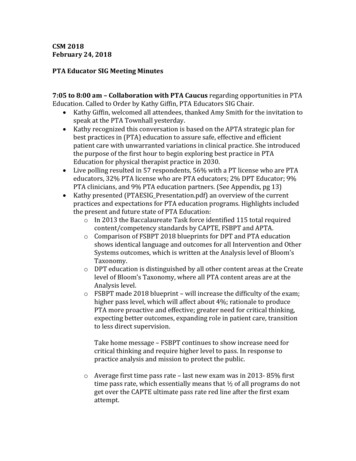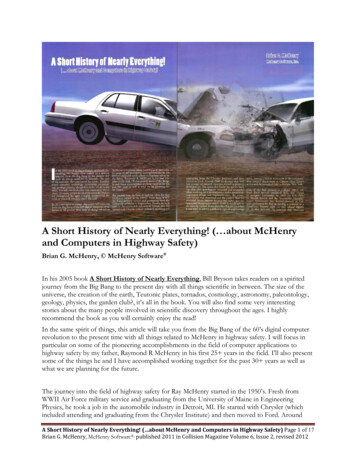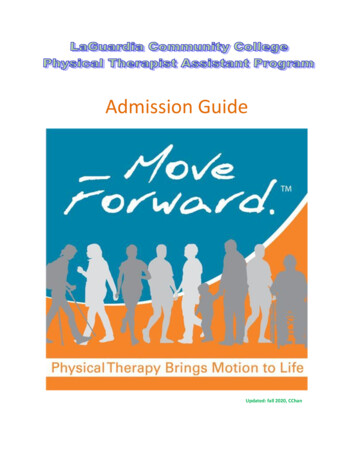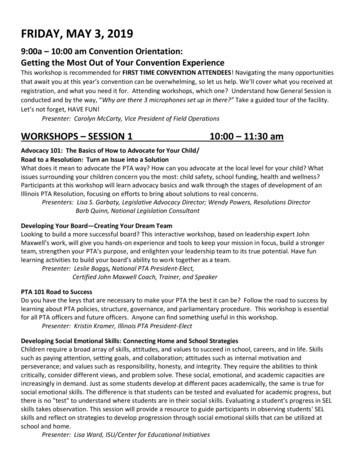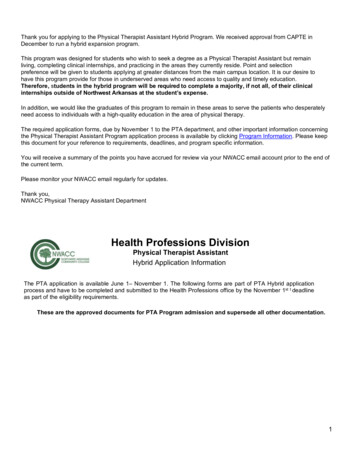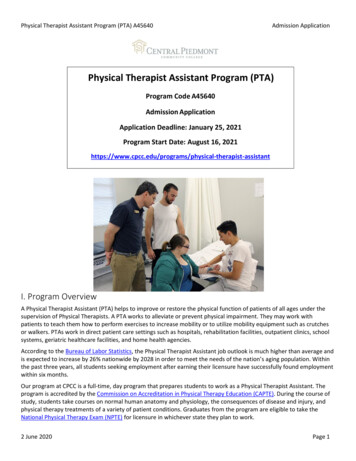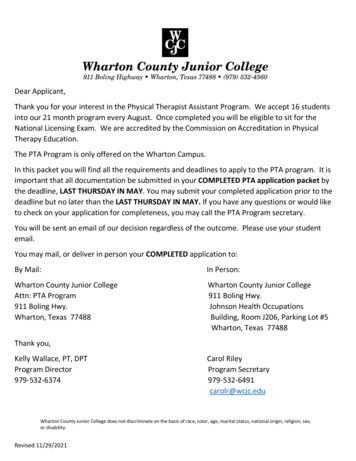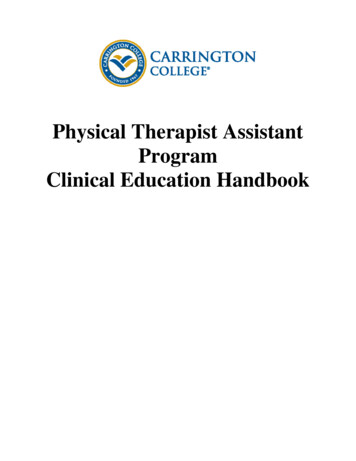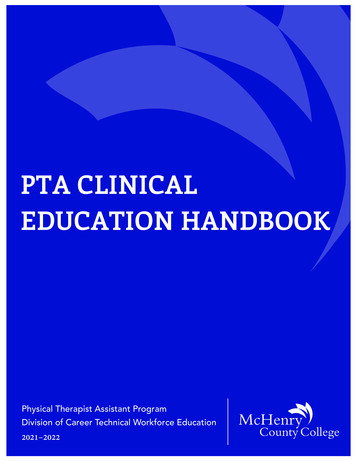
Transcription
PTA CLINICALEDUCATION HANDBOOKPhysical Therapist Assistant ProgramDivision of Career Technical Workforce Education2021–2022
The Physical Therapist Assistant Program at McHenry County College is accredited by the Commission onAccreditation in Physical Therapy Education (CAPTE) (3030 Potomac Ave., Suite 100. Alexandria, VA 223053085; phone: 703-706-3245; email: accreditation@apta.org). If needing to contact the program/institutiondirectly, please call (815) 479-7592 or email clouderman@mchenry.edu
Welcome to Clinical Education!We hope the contents of this manual will assist in providing a high quality clinical educationexperience for both clinical faculty members and their students. Clinical education is a vitalportion of the physical therapist assistant curriculum. It allows the student to fully integrate andimplement the information and skills learned during basic science coursework, as well as theclinical classroom and laboratory portions of the program.The purpose of this handbook is to provide information and guidelines as a common frame ofreference for all who are involved in the clinical education process: The student The Clinical Instructor The Center Coordinator of Clinical Education The academic faculty members of the PTA Program at McHenry County CollegeIf you have any questions or concerns, please do not hesitate to contact me.Thank you,Angela Wallace PTA, MA Clinical Education Coordinator & Christen Louderman PT, DPTProgram Chair2
Table of ContentsWelcome . 2Table of Contents . 3Harassment and Discrimination . 5MISSION STATEMENTS . 7McHenry County College Mission and Vision Statements. 7Physical Therapist Assistant Program Mission Statement . 7GENERAL EDUCATION AND PTA PROGRAM GOALS . 8MCC General Education Goals. 8MCC PTA Program Goals . 9Program Objectives . 9Curriculum Course Sequence .10Course Descriptions .10Clinical Experience Course Objectives .14GENERAL GUIDELINES AND PROCEDURES .16Selection of Clinical Education Sites and Clinical Instructors .16Criteria for Selection of Clinical Education Sites .16Criteria for Selection of Clinical Instructors (CI): .17Program Expectations for Clinical Competence of CIs.17Program Expectations for Clinical Teaching Effectiveness of CIs. .17Responsibilities of the Program Chair (PC) .17Responsibilities of the Clinical Education Coordinator (CEC) .18Responsibilities of the Center Coordinator of Clinical Education (CCCE) .18Responsibilities of the Clinical Instructor (CI) .19Affiliation Agreement .20Arrangement of Clinical Experiences .21Readiness for Clinical Experiences .21Criteria for Passing PTA 145 Introduction to Clinical Education .21Determination of Satisfactory Progress of Clinical Experiences .22Incomplete Grade for a Full-time Clinical Education Experience .26School Holiday and Inclement Weather .27STUDENT PTA LEGAL PRACTICE GUIDELINES .27STUDENT RESPONSIBILITIES AT CLINICAL SITES .273
PTA PROGRAM CLINICAL EDUCATION EXPECTATIONS AND REQUIREMENTS OFSTUDENTS .29Attendance .29Makeup Guideline .30Professional Behavior.30Dress Code .31Transportation .31Nametags .31Student Preparedness .32Confidentiality of Student Clinical Experience Records.32HIPAA .32CPR Requirements.32Physical Exam/Immunizations Requirements .33Health Insurance .34Drug Testing and Criminal Background Checks .34Temporary Accommodations .34Accidents.34Accommodations for Students with Disabilities .35Student In-Services .35Early Termination of Clinical Experience .36Due Process/Grievance Procedure .36Clinical Reassignment .36Knowledge of Program and College Policies and Procedures .37Informed Consent .37Affiliation Agreement .37Equipment and Facility Safety .37Confidentiality .38Supervision .38Complaints .38Education Tips for the Clinical Instructor.38APPENDIX.40APTA Standards of Ethical Conduct for the Physical Therapist Assistant .41MCC PTA Program Essential Functions .444
PTA 145 Introduction to Clinical Education Skills Checklist .47Skills Learned by 1st Year MCC PTA Students .48Skills Learned by 2nd Year MCC PTA Students .50Professional Behaviors Assessment Tool .54Physical Therapy Assistant Program Clinical Handbook Agreement .61Clinical Orientation Checklist .62Clinical Instructor Curriculum Review Form .63Clinical Instructor/Student Meeting Form .64Confidentiality Agreement.65Student In-service Feedback Form .66PTA Student Evaluation Clinical Experience and Clinical Instruction .675
McHenry County College Statement on Harassment and DiscriminationThe College seeks to maintain an academic and work environment free from harassment anddiscrimination for students, faculty, and staff. Harassment and discrimination are contrary to thestandards of the College community; they diminish individual dignity and impede equalemployment and educational opportunities.In compliance with all applicable laws, the College prohibits discrimination and harassmentbased on race, color, creed or religion, sex, national origin, ancestry, age, order of protectionstatus, marital status, physical or mental disabilities, military status, sexual orientation, genderrelated identity, pregnancy, unfavorable military discharge, or other factors prohibited by law inadmissions, employment, participation in educational programs, or activities. Decisionsregarding employment include hiring, promotion, termination, wages or salaries, benefits, andother terms and conditions of employment.Intimidation, discrimination, and harassment, including sexual discrimination, can arise from abroad range of verbal, nonverbal, and/or physical behaviors. Discrimination, harassment, and/orintimidation can be perpetrated by employees, students, outside contractors, or other individualson the College’s premises The College strictly prohibits such misconduct and similarunacceptable activities that could become a condition of employment or a basis for educationalor personnel decisions, or which create a hostile environment.Any employee or student who engages in discrimination or harassment, or who retaliatesagainst another individual for making or participating in the investigation of a report ofdiscrimination or harassment, is subject to discipline, up to and including termination orexpulsion from the College.Individuals who believe they have experienced harassment or discrimination prohibited by thestatements above are encouraged to contact the appropriate office. Students should contact theOffice of Student Conduct, A252, at (815) 455-8696. Employees should contact RachelBoldman, Title IX Coordinator at (815) 479-7572.6
MISSION STATEMENTSMcHenry County College Mission and Vision StatementsMission: Our focus is learning. Student success is our goal.Vision: The community’s first choice for a lifetime of learning.Physical Therapist Assistant Program Mission StatementProvide comprehensive learning experiences leading to successful employment as an entrylevel physical therapist assistant who is able to work under the direction and supervision of aphysical therapist, and who is able to meet the needs of employers and the community7
GENERAL EDUCATION AND PTA PROGRAM GOALSMCC General Education GoalsCritical Thinking:Students who graduate from MCC are critical thinkers. They are able to do the following thingsat a level appropriate for a 2-year degree holder. Combine stated truths and facts to make arguments and develop new ideas Interpret data and draw conclusions Construct arguments supported with more than opinion Recognize bias and act in ways that questions assumptionsEffective Communication:Students who graduate from MCC are effective communicators. They are able to do thefollowing things at a level appropriate for a 2-year degree holder. Select from a variety of communication style based on the situation Listen attentively Adapt to audience and context in professional and/or personal interactionsInformation Literacy:Students who graduate from MCC are information literate. They are able to do the followingthings at a level appropriate for a 2-year degree holder. Access multiple sources to provide sound evidence Ensure information is of quality and use the information to accomplish an academic goal Acknowledge where information is coming from and whom it belongs toProfessionalism:Students who graduate from MCC are professional. They are able to do the following things at alevel appropriate for a 2-year degree holder. Speak and act honestly Engage in courteous and culturally sensitive interactions Present themselves and actions appropriately in professional environments (thisincludes in written form such as emails, in person through timely and respectfulinteractions, and adherence to professional codes and standards). Follow through on commitments.8
MCC PTA Program Goals The PTA Program will produce clinically competent entry-level physical therapistassistants who work under the direction and supervision of a physical therapist and whoare able to meet the needs of their patients, employers, and the communityThe Program will provide an organized, sequential, and comprehensive curriculumintegrating classroom, laboratory and clinical education experiences to preparegraduates for contemporary, evidence-based physical therapy practice.Program faculty will maintain currency in contemporary physical therapy practice toensure a current, comprehensive evidence-based curriculum consistent with collegerequirements and CAPTE standards.Faculty and students will promote the importance of lifelong learning, professionalengagement, and community awareness regarding physical therapy.Program ObjectivesGraduates of the McHenry County College PTA Program will Work as a clinically competent entry-level physical therapist assistant under the directionand supervision of a physical therapist. Demonstrate effective communication skills in a culturally competent manner withpatients, family members/caregivers, and healthcare professionals. Increase community awareness of the role of the physical therapist assistant. Demonstrate an awareness of the importance of lifelong learning and professionalengagement.9
Curriculum Course SequenceFall- first yearPTA 101 Intro to PTAPTA 120 PTA Patient Interventions IBIO 157 Fundamentals of Biology-orBIO 263 Human Anatomy & Physiology IENG 151 Composition IHCE 111 Evidence Based PracticeAOM 135 Medical TerminologyCredit Hours34(4)431318Spring- first yearCredit HoursPTA 130 PTA Patient Assessment I4PTA 141 PTA Kinesiology4PTA 142 PTA Pathophysiology2PTA 145 Intro to Clinical Education1BIO 263 Human Anatomy & Physiology I (if not previously completed)(4)-orBIO 264 Human Anatomy & Physiology II4PSY 151 Introduction to Psychology318Summer-first year151 PTA Clinical Experience ISPE 151 Intro to Speech (recommended taking online)Credit Hours336Fall – second yearCredit HoursPTA 210 PTA Patient Assessment II3PTA 220 PTA Patient Interventions II4PTA 240 PTA Administration1PTA 242 PTA Rehabilitation Strategies3Humanities or Fine Arts3BIO 264 Human Anatomy & Physiology II (if not previously completed)(4)14 (18)Spring- second yearPTA 250 PTA Clinical Experience IIPTA 251 PTA Clinical Experience IIIPTA 252 PTA Clinical SeminarCredit Hours44210Total Credits: 6610
Course DescriptionsPTA 101, Introduction to PTAIntroduction to PTA students learn about the healthcare continuum and the range of patient careservices offered, legal and ethical guidelines for practice, healthcare teams, Physical Therapist(PT) / Physical Therapist Assistant (PTA) relationships, and effective intercultural andinterpersonal communication skills. They will also learn how to document patient care servicesalong the healthcare continuum. Students will explore collaborative relationships with the PTand other healthcare team members and learn how to recognize what is beyond the PTA scopeof practice.PTA 120, Interventions IPTA Patient Interventions I prepares students to implement components of the plan of careestablished by the physical therapist. Students will relate the plan of care developed by thephysical therapist to short and long term goals and intended outcomes. Students will learn howto implement functional training, perform selected therapeutic exercise interventions, and applysuperficial heat and cold modalities. They will also learn how to incorporate effective teachingstrategies during interventions, how to consult with the physical therapist and how to contributeto patients’ discontinuation of care from facilities or servicePTA 130, Assessment ICourse Description: PTA Patient Assessment I prepares students to gather data essential forcarrying out the patients’ plan of care developed by the physical therapist. Students will learnhow to perform components of the assessments of arousal, mentation and cognition; aerobiccapacity and endurance, vital signs, anthropometric characteristics, joint integrity and mobility,muscle performance, gait, locomotion, and balance. They will learn how assess normal andabnormal integumentary. Students will also learn how to administer standardized tests for painas well as how to assess factors that contribute to pain. They will learn normal and abnormalpatient responses. Students will be exposed to medical and surgical conditions that arecommonly seen by the PTA.PTA 141, KinesiologyPTA Kinesiology provides students an opportunity to apply their knowledge of musculoskeletalanatomy to functional movements and activities of daily living. Instruction includes softtissue/bony landmark palpation, joint structure, muscle function as well as osteo-kinematic andarthro-kinematic motion of each major joint of the musculoskeletal system. Students studynormal/abnormal postures and gait patterns. This course is a foundation for the students’Physical Therapist Assistant Program Assessment courses, Intervention II course, and PTARehabilitation Strategies.PTA 142, PathophysiologyPTA Pathophysiology includes the study of diseases and disorders commonly seen in physicaltherapy practice. The course includes an overview of the etiology, pathogenesis,signs/symptoms, medical management, and how pathology may impact the delivery of physical11
therapy services. Study covers body systems pathologies across the life span includingneuromuscular, musculoskeletal, cardiovascular, pulmonary, integumentary, gastrointestinal,endocrine, lymphatic, and other special systems. Age-related changes pertaining to variousbody systems are identified to provide students with awareness of life span changes. Thiscourse is a foundation for the students’ Physical Therapist Assistant Program Assessmentcourses, Intervention II course, and PTA Rehabilitation Strategies.PTA 145, Introduction to Clinical EducationIntroduction to Clinical Education is a part-time, 5 hours/day, 1 day per week for 12 weeks (totalof 60 hours) clinical education experience where foundational knowledge and skills are appliedto direct patient care in selected physical therapy settings. Students may be scheduled at one ormore clinical sites. Concurrent with spring semester courses, this course provides students theopportunity to perform physical therapy data collection techniques and treatment interventionswith uncomplicated patients along with a high degree of supervision and guidance from thesupervising physical therapist and/or physical therapist assistant who function as the student’sclinical instructor (C.I.). Students have opportunities to apply and further develop learning fromthe didactic portion of the curriculum in a clinical environment that fosters learning, problemsolving, and critical thinking.PTA 151, Clinical Experience IPTA Clinical Experience I is a full-time, 40 hours/week for 4.5-weeks (total of 180 hours) clinicalexperience where students continue their preparation to function as entry-level physicaltherapist assistants while they are provided opportunities to apply and further developknowledge, behaviors, and skills from the didactic portion of the first year of the curriculum.Students may be scheduled at one or more clinical sites. Students follow establishedinterventions, perform selected data collection, and practice hands-on techniques whilesupervised and mentored by clinical instructors (licensed physical therapists &/or licensedphysical therapist assistants).PTA 210 Assessment IIPTA Patient Assessment II continues to prepare students to gather data identified essential forcarrying out the patients’ plan of care developed by the physical therapist. In this coursestudents will learn how to perform components of the assessments after activity withmeasurement of vital signs, cardiovascular function, ventilation, respiration and self-care andhome management and community or work reintegration. They will learn how to identify normaland abnormal responses in patients. They will also learn how to recognize positions, postures oractivities that could aggravate or relieve pain and skin trauma.PTA 220, Interventions IIPTA Patient Interventions II continues to prepare students to implement components of the planof care established by the physical therapist. Students will learn how to perform and teachbalance, coordination, posture and breathing exercises; perform massage, deep heat, traction,biofeedback, hydrotherapy and electrotherapeutic agents; perform wellness interventions,wound management, isolation and infection control techniques. Students will also learn how to12
apply patient education (motor learning) interventions directed by the physical therapist and howto contribute to patients’ discontinuation of care from facility or service.PTA 240 AdministrationIn PTA Administration, students expand their understanding of Physical Therapist (PT) /Physical Therapist Assistant (PTA) relationships, focusing on discharge planning, qualityassurance and social responsibility. They will explore their role in education and participate inprofessional and community organizations. They will also develop a resume suitable forbeginning their search for employment.PTA 242, Rehabilitation StrategiesPTA Rehabilitation Strategies continues to prepare students to perform appropriate assessmenttechniques and treatment interventions from within the plan of care established by the physicaltherapist for patients with acquired and/or progressive neurological disorders as well as forspecial patient populations including pediatrics, geriatrics, and patients with amputations. Othertopics of study include the study of neuro-motor development, neuromuscular rehabilitationtechniques, and the effects of age-related changes on functional movement across the lifespanPTA 250, Clinical Experience IIClinical Experiences II is a full-time, 40 hours/week for six (6)-weeks (total of 240 hours), clinicalexperience that continues to prepare students to function as entry-level physical therapistassistants while they are provided opportunities to apply and further develop knowledge,behaviors and skills learned in all prior PTA program courses. Students apply establishedinterventions, perform selected data collection and practice hands-on techniques whilesupervised and mentored by clinical instructors (licensed physical therapists &/or licensedphysical therapist assistants).PTA 251, Clinical Experience IIIClinical Experience III is a full-time, 40 hours/week six-week, (total of 240 hours) clinicalexperience that continues to prepare students to function as entry-level physical therapistassistants while they are provided opportunities to apply and further develop knowledge,behaviors and skills learned in all prior PTA program courses. Students apply establishedinterventions, perform selected data collection and practice hands-on techniques whilesupervised and mentored by clinical instructors (licensed physical therapists &/or licensedphysical therapist assistants). Upon completion of this course, students are expected todemonstrate patient care skills compatible to the role of an entry-level PTA.13
Clinical Experience Course ObjectivesPTA 145, Introduction to Clinical EducationAt the completion of this course students will be able to:1. Demonstrate the ability to safely perform selected physical therapy assessmenttechniques and treatment interventions from within the physical therapist’s plan of carefor routine patients with non-complicated diagnosis with a high degree of supervisionand guidance by a physical therapist.2. Given additional time along with a high degree of supervision, demonstrate the ability toadequately perform documentation, and communication with the supervising physical3. Demonstrate the ability to assist with the education of patients and familymembers/caregivers4. Demonstrate the ability to summarize treatment plans, physical therapy goals, andintended treatment outcomes, for patients with a non-complicated diagnosis with a highdegree of guidance from the supervising physical therapist5. Demonstrate appropriate professional clinical behaviors within the context of physicaltherapy, by achieving at least 50% intermediate level for all ten components of theProfessional Behavior Assessment Tool. (Faculty Professional Behaviors Assessment)PTA 151, Clinical Experience IAt the completion of this course students will be able to:1. Demonstrate the ability to safely perform selected physical therapy assessmentskills and treatment interventions from within the physical therapist’s plan of carefor routine patients with moderate supervision and guidance by the physicaltherapist (CPI, PC# 1, 5-13).2. Demonstrate the ability to perform adequate documentation and communication withthe physical therapist, given extra time and guidance, regarding all aspects ofpatient status, patient treatment and patient response to treatment (CPI, PC# 3, 5,13 & 14).3. Demonstrate the ability to assist the supervising physical therapist in the educationof patients and family members/caregivers (CPI, PC# 5).4. Demonstrate the ability to perform adequate patient communication, in aculturally competent manner, with moderate guidance from the physicaltherapist (CPI, PC #3-5 & 7).5. Demonstrate the ability to participate in scheduling and other routine administrativeprocedures of the physical therapy department (CPI, PC# 5 & 14).6. Recognize administrative roles and duties through attendance at departmentalmeetings, committee meetings, and case conferences with other healthcareproviders as appropriate. (CPI, PC# 14).7. Demonstrate appropriate legal and ethical behavior during skill performance andinteractions with patients, family members, and other healthcare providers withoccasional guidance from the supervising physical therapist (CPI, PC #2 & 3).8. Design and provide an in-service to health care professionals utilizing appropriate14
evidence-based resources. (CPI, PC # 5).9. Recognize the interprofessional activities that are available within a given healthcaresetting and reflect upon the role of the PTA within this interaction.PTA 250, Clinical Experience IIAt the completion of this course students will be able to:1. Demonstrate the ability to consistently perform safe, effective, and competent physicaltherapy assessment skills and treatment interventions from within the physicaltherapist’s plan of care for routine patients with minimal supervision and guidance by thephysical therapist.2. Demonstrate the ability to provide timely and relevant documentation andcommunication to the physical therapist regarding all aspects of patient status, patienttreatment and patient response to the treatment with occasional guidance from thephysical therapist.3. Demonstrate the ability to participate in the teaching of patients, familymembers/caregivers
MCC PTA Program Goals The PTA Program will produce clinically competent entry-level physical therapist assistants who work under the direction and supervision of a physical therapist and who are able to meet the needs of their patients, employers, and the community

